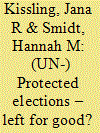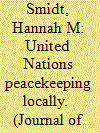|
|
|
Sort Order |
|
|
|
Items / Page
|
|
|
|
|
|
|
| Srl | Item |
| 1 |
ID:
192950


|
|
|
|
|
| Summary/Abstract |
How does the phased withdrawal of United Nations peacekeeping operations (PKOs) influence electoral violence? Many PKOs recently ended and peacekeeping personnel numbers are decreasing. Yet, research on peacekeepers’ exit remains in its infancy. We help fill this lacuna and examine how peacekeepers’ withdrawal affects violence during electoral periods. We focus on electoral periods because elections are both often-desired intervention endpoints and violence-prone moments in post-war trajectories. We argue that electoral violence increases shortly after a reduction in PKO troops because shortfalls in external oversight and security assistance reduce costs for organizing violence and open opportunities for pursuing a coercive electoral strategy. However, violence-inducing exit effects are likely short-lived due to adaptation by domestic security forces or peacekeepers who remain in the host country. We examine our argument across electoral periods and first-order administrative units of all African countries hosting a PKO (2001–2017). Controlling for violence trends prior to peacekeepers’ exit, two-way fixed effects models suggest that a local reduction in PKO troops is not associated with subsequent increases in electoral violence. However, withdrawal incidents lead to spikes in political violence more broadly defined. Our results confirm worries that downsizing during election times may endanger security gains in post-war countries.
|
|
|
|
|
|
|
|
|
|
|
|
|
|
|
|
| 2 |
ID:
186332


|
|
|
|
|
| Summary/Abstract |
Research on UN peacekeeping operations has established that operations' size and composition affect peacekeeping success. However, we lack systematic data for evaluating whether variation in tasks assigned to UN peacekeeping mandates matters and what explains different configurations of mandated tasks in the first place. Drawing on UN Security Council resolutions that establish, extend, or revise mandates of 27 UN peacekeeping operations in Africa in the 1991–2017 period, the Peacekeeping Mandates (PEMA) dataset fills this gap. It records 41 distinct tasks, ranging from disarmament to reconciliation and electoral support. For each task, the PEMA dataset also distinguishes between three modalities of engagement (monitoring, assisting, and securing) and whether the task is requested or merely encouraged. To illustrate the usefulness of our data, we re-examine Hultman, Kathman, and Shannon’s (2013) analysis of operations’ ability to protect civilians. Our results show that host governments and rebel groups respond differently to civilian protection mandates.
|
|
|
|
|
|
|
|
|
|
|
|
|
|
|
|
| 3 |
ID:
173774


|
|
|
|
|
| Summary/Abstract |
United Nations peacekeeping operations (UN PKOs) increasingly engage with local communities to support peace processes in war-torn countries. Yet, while existing research tends to focus on the coercive and state-building functions of UN PKOs, their concrete local activities with community leaders and populations remain, empirically and theoretically, understudied. Thus, this study investigates how peacekeepers’ community-based intergroup dialogue activities influence communal violence. It argues that facilitating dialogue between different communal identity-based groups locally can revive intergroup coordination and diminish negative biases against other groups, thereby reducing the risk of communal conflict escalation. This argument is tested using a novel data set of intergroup dialogue activities organized by the UN PKO in Côte d’Ivoire across 107 departments from October 2011 to May 2016. Bivariate probit and matching address the nonrandom assignment of these interventions. The analyses provide robust evidence that the UN PKO mitigated communal violence by organizing intergroup dialogues.
|
|
|
|
|
|
|
|
|
|
|
|
|
|
|
|
|
|
|
|
|